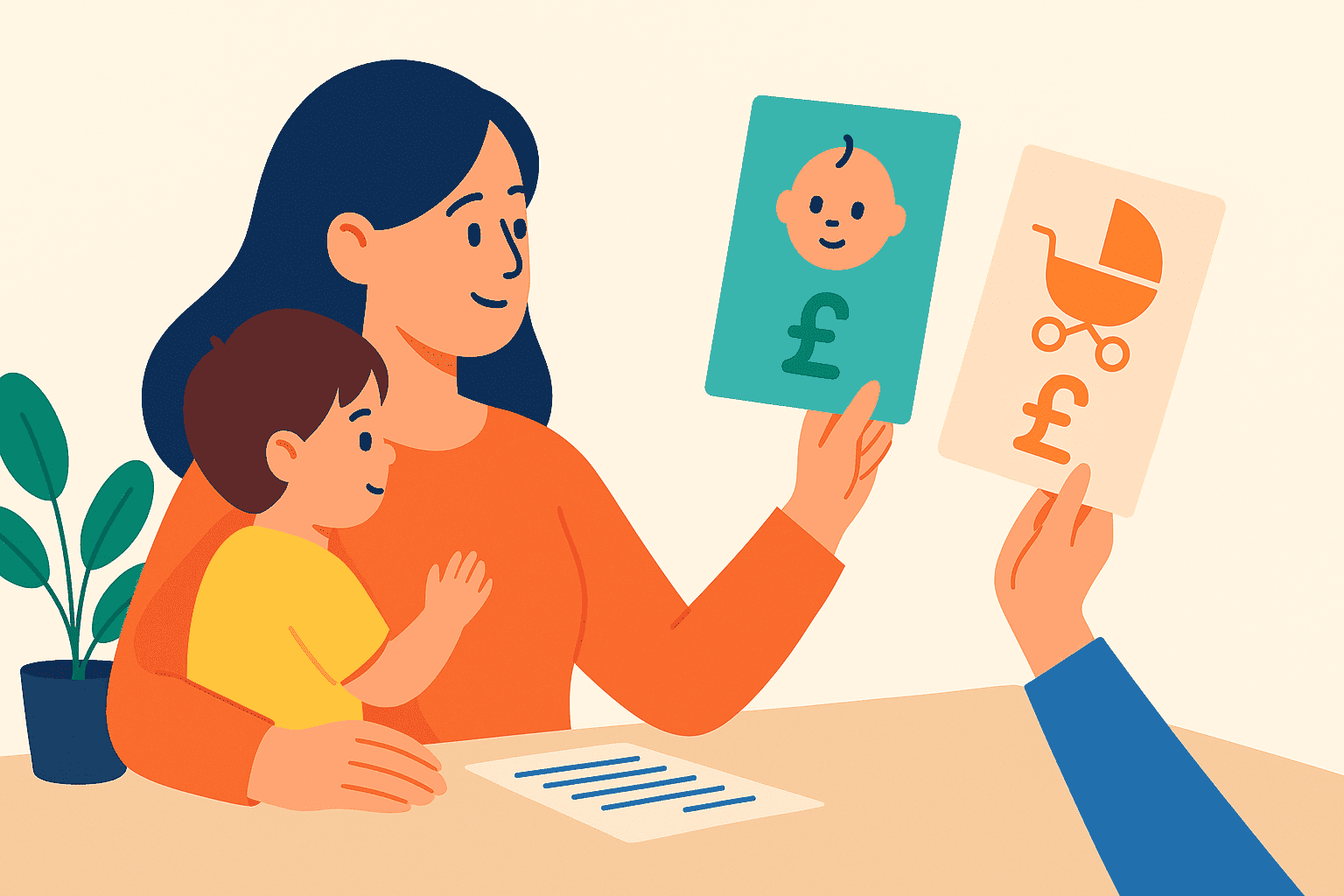Tax-Free Childcare vs Child Benefit: Which Works Best in the UK?
Tax-Free Childcare and Child Benefit are both valuable UK schemes—but which is best for your family? Here's how to compare and choose.

Tax-Free Childcare or Child Benefit: Which Is the Better One for Your Family?
Family is a rewarding exercise in life, and bringing up children in this country is not cheap. When juggling side work, freelancing, or full-time employment, the Tax-Free Childcare scheme and Child Benefit scheme are there to help you with your load.
But what do they offer? And are they something you can have the two together? More importantly, which one is more suitable for your family?
In this guide, we take a look at how both schemes work, who qualifies for the scheme, and when would it be a consideration to choose one over the other. Then we will discuss some detailed tricks and tips in order to make the best out of the help available in the 2025/26 tax year.
Basics First
What is Child Benefit?
Child Benefit is paid for any parent raising children in the UK, irrespective of their financial state.
- Paid every four weeks (or weekly if you are a lone parent or are on certain benefits)
- You receive:
- £25.60 per week for the eldest or only child
- £16.95 per week for every other child
- No income restrictions for claiming, but the High Income Child Benefit Charge (HICBC) kicks in if one parent earns more than £60,000
What do you need to apply?
- A UK bank account
- A birth certificate or adoption papers of your child
- To be responsible for the care of the child
What is Tax-Free Childcare?
Tax-Free Childcare is for working parents to cover some of the cost of childcare for a range of childcare providers. These include:
- Nurseries
- Childminders
- After-school clubs
- Holiday schemes
How it works:
- You open an online childcare account.
- For every 8 pounds that you pay in, the government puts in 2 pounds up to a maximum of 2,000 pounds per child per year.
- It is applicable for children under 12 or under 17 if disabled.
Apply for Tax-Free Childcare on GOV.UK
Side-by-Side Differences
| Features | Child Benefit | Tax-Free Childcare |
|---|---|---|
| Who can claim | Most UK parents | Working parents (£1,976-£100,000*) |
| Child's age | Under 16 (or 20 in education) | Under 12 (17 if disabled) |
| Payment amount | £25.60 (first child), £16.95 (others) | Up to £2,000/year per child |
| Income restrictions | HICBC kicks in from £60,000 | Cannot receive if over £100,000 (per parent) |
| Can claim both? | Yes, if eligible | Yes |
*Figures accurate for 2025/26 tax year
What Is Good to Fit Your Family?
When Child Benefit Is a Better Option
Child Benefit is normally the first scheme every parent should apply for especially when:
- Parent is not working or working part-time
- No access to registered childcare
- Income is below £60,000
You might still want to claim, even if the High Income Child Benefit Charge applies:
- National Insurance credits towards your State Pension will be accrued
- You can choose to stop receiving payments but stay on as registered for the benefit
When Tax-Free Childcare Is the Smarter Choice
Considered a game-changer scheme when:
- Are paying registered childcare
- Both partners (or the sole parent) are working and earning at least £1,976/year
- Are earning less than £100,000
Particularly beneficial for:
- Freelancers or self-employed people not having employer-subsidized childcare
- Families with multiple children in childcare
Save up to:
- £2,000 per child each year, or
- £4,000 if your child is disabled
Frequently Asked Questions
Can I claim both Child Benefit and Tax-Free Childcare?
Yes! These schemes are not mutually exclusive. Actually, many families derive benefit from using both—Child Benefit as a base and Tax-Free Childcare to reduce either nursery costs or after-school costs.
And what about Universal Credit?
If you're claiming Universal Credit, you cannot receive Tax-Free Childcare. However, Universal Credit might meet as much as 85% of the childcare cost, so it is good about weighing your choices.
Use the benefits calculator to explore what works best.
Do I lose Child Benefit if I earn too much?
You can still get it but:
- If one partner has an income of over £60,000, you pay the High Income Child Benefit Charge
- At £80,000, the charge cancels the benefit
You can agree to cancel direct payments to yourself but accumulate NI credits by registering.
A Quick Example
Context: Sophie and Jack have two children under 10 years old. Jack earns around £45,000, and Sophie is self-employed with an income of £25,000. They pay £600 per month for nursery.
- Child Benefit: They will get £42.55 weekly (£2,212.60 per annum)
- Tax-Free Childcare: For their £600/month (£7,200/year) childcare costs, they get a £1,440/year government top-up
Total support for the year: £3,652.60
To Wrap It Up
Both Tax-Free Childcare and Child Benefit could be intricate ways in which a family in the UK could, in a big way, lower their expenditure. One provides constant support to all parents, while the other offer significant savings to working parents paying for childcare.
Which one should you go for? Most often, a bit of both—depending on work patterns, income, and family setup.
So stay in tune with everything pertaining to the schemes. Claim what really belongs to you and do not just leave your cash on the table.